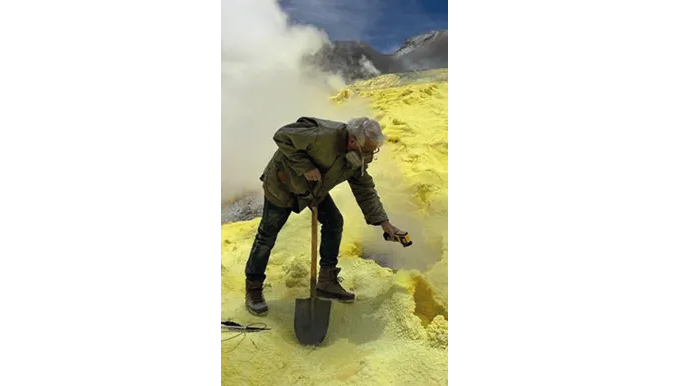Gasanalytik
Kontakt:
Web:
Infrastrukturzugehörigkeit:
Die Gasgeochemie ist ein wesentlicher Aspekt in vielen Forschungsbereichen, wie der Vulkanologie, der Umweltforschung und der Rohstoffexploration.
Das Gasgeochemie-Labor des GFZ (GGL) analysiert routinemäßig die meisten Permanentgase. Je nach Anwendungsfall sind oft individuelle Ansätze erforderlich. Neben der Gasphase aus verschiedenen Quellen können auch Prozessgase (z.B. Korrosion und hydrolytischer H₂ in Bohrlöchern) und synthetische Tracergase (z.B. SF₆) analysiert werden.
Die Entnahme von Gasproben vor Ort (Bohrlöcher, aktive Vulkangebiete, Höhlensysteme, unterirdische Salz- und Goldminen, CO₂-Sequestrationsstandorte und Gebiete mit natürlicher Wasserstoffemission) macht einen großen Teil der Arbeit des GGL-Teams aus. Auch die Installation und Wartung von permanenten Gasmessstationen gehört zur Aufgabe des GFZ GGL.
Fachspezifische Schlagworte
- Gas Chromatography
- Gas Chromatography Flame Ionization Detection
- Mass Spectrometry
- Geochemie
- Vulkanologie
Kategorien
Instrumentierung
Es steht eine große Anzahl von Gasanalysatoren und eine breite Palette von Gastrennverfahren zur Verfügung.
-
Mehrere Quadrupol-Massenspektrometer (Omnistar, Pfeiffer Vacuum) und ein mobiles Feldgerät (Mini Ruedi, Gasometrix).
-
Gaschromatographen (SRI 8610), ausgestattet mit verschiedenen Trennsäulen und Detektoren (FID, TCD, HID).
-
Photoakustischer Sensor (Innova 1412, Air Tech Instruments) zur Messung von CO₂, CH₄, H₂ und H₂S im µmol/mol-Bereich und SF₆ im nmol/mol-Bereich.
-
Toxic Vapour Analyzer (TVA, Thermo Fisher Scientific (tragbarer GC für Kohlenwasserstoffe)
-
Alpha Guard (Bertin Technologies) für Radon
-
Li-COR-Akkumulationskammersysteme (Li 8250-M4 Multiplexer mit LI 8100 und LI-7810 Spurengasanalysator) für CO₂- und CH₄-Flussmessungen
Instrumente
-
Gas Chromatograph
Gas chromatography - specifically gas-liquid chromatography - involves a sample being vapourised and injected onto the head of the chromatographic column. The sample is transported through the column by the flow of inert, gaseous mobile phase. The column itself contains a liquid stationary phase which is adsorbed onto the surface of an inert solid. (Source: Global Change Master Directory (GCMD). 2023. GCMD Keywords, Version 16.3. Greenbelt, MD: Earth Science Data and Information System, Earth Science Projects pision, Goddard Space Flight Center (GSFC) National Aeronautics and Space Administration (NASA). URL (GCMD Keyword Forum Page): https://forum.earthdata.nasa.gov/app.php/tag/GCMD+Keywords)
-
Gas Chromatography Flame Ionization Detector
Gas Chromatography - Flame Ionization Detector or GC-FID is a common analytical technique that is widely used in the petrochemical, pharmaceutical and natural gas markets. A flame ionization detector (FID) is a scientific instrument that measures the concentration of organic species in a gas stream. It is frequently used as a detector in gas chromatography. An FID typically uses a Hydrogen/Air flame into which the sample is passed to oxidize organic molecules and produces electrically charged particles (ions). The ions are collected and produce an electrical signal which is then measured. (Source: Global Change Master Directory (GCMD). 2023. GCMD Keywords, Version 16.3. Greenbelt, MD: Earth Science Data and Information System, Earth Science Projects pision, Goddard Space Flight Center (GSFC) National Aeronautics and Space Administration (NASA). URL (GCMD Keyword Forum Page): https://forum.earthdata.nasa.gov/app.php/tag/GCMD+Keywords)
-
Mass Spectrometer
Mass spectrometers are spectrometers that deal mainly with mass or quantitative amount such as weight in a gravitational field. (Source: Global Change Master Directory (GCMD). 2023. GCMD Keywords, Version 16.3. Greenbelt, MD: Earth Science Data and Information System, Earth Science Projects pision, Goddard Space Flight Center (GSFC) National Aeronautics and Space Administration (NASA). URL (GCMD Keyword Forum Page): https://forum.earthdata.nasa.gov/app.php/tag/GCMD+Keywords)
Beziehungen
- ist Teil von

